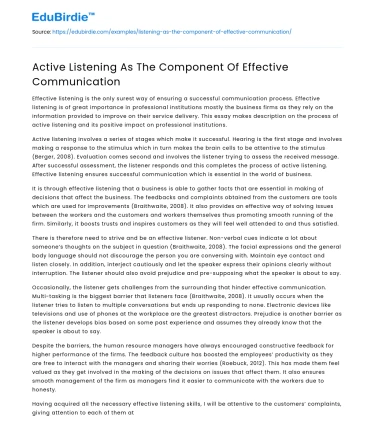Effective listening is the only surest way of ensuring a successful communication process. Effective listening is of great importance in professional institutions mostly the business firms as they rely on the information provided to improve on their service delivery. This essay makes description on the process of active listening and its positive impact on professional institutions.
Active listening involves a series of stages which make it successful. Hearing is the first stage and involves making a response to the stimulus which in turn makes the brain cells to be attentive to the stimulus (Berger, 2008). Evaluation comes second and involves the listener trying to assess the received message. After successful assessment, the listener responds and this completes the process of active listening. Effective listening ensures successful communication which is essential in the world of business.
Save your time!
We can take care of your essay
- Proper editing and formatting
- Free revision, title page, and bibliography
- Flexible prices and money-back guarantee
It is through effective listening that a business is able to gather facts that are essential in making of decisions that affect the business. The feedbacks and complaints obtained from the customers are tools which are used for improvements (Braithwaite, 2008). It also provides an effective way of solving issues between the workers and the customers and workers themselves thus promoting smooth running of the firm. Similarly, it boosts trusts and inspires customers as they will feel well attended to and thus satisfied.
There is therefore need to strive and be an effective listener. Non-verbal cues indicate a lot about someone’s thoughts on the subject in question (Braithwaite, 2008). The facial expressions and the general body language should not discourage the person you are conversing with. Maintain eye contact and listen closely. In addition, interject cautiously and let the speaker express their opinions clearly without interruption. The listener should also avoid prejudice and pre-supposing what the speaker is about to say.
Occasionally, the listener gets challenges from the surrounding that hinder effective communication. Multi-tasking is the biggest barrier that listeners face (Braithwaite, 2008). It usually occurs when the listener tries to listen to multiple conversations but ends up responding to none. Electronic devices like televisions and use of phones at the workplace are the greatest distractors. Prejudice is another barrier as the listener develops bias based on some past experience and assumes they already know that the speaker is about to say.
Despite the barriers, the human resource managers have always encouraged constructive feedback for higher performance of the firms. The feedback culture has boosted the employees’ productivity as they are free to interact with the managers and sharing their worries (Roebuck, 2012). This has made them feel valued as they get involved in the making of the decisions on issues that affect them. It also ensures smooth management of the firm as managers find it easier to communicate with the workers due to honesty.
Having acquired all the necessary effective listening skills, I will be attentive to the customers’ complaints, giving attention to each of them at a time and try to avoid any kind of distractions from the electronic devices and the surrounding. I will also try to explain to them the reason for the delay in the delivery. Due to the honesty within the organization, I would be open to my supervisor and raise the concerns given by the customers on late delivery and delivery of damaged goods as this feedback will be used to improve the company’s services.
References
- Berger, C. R. (2005). Interpersonal Communication. Theoretical perspective, future prospects. Journal of communication. 55, (3): 415-447
- Braithwaite, D. O. and Baxter, L. A. (2008). Introduction: Meta-theory in Interpersonal Communication Research. Engaging theories in Interpersonal Communication Research: Multiple perspectives. Los Angeles. Sage
- Roebuck, D. B. (2012). Communication strategies for todays’ managerial leader. Business Expert Press.






 Stuck on your essay?
Stuck on your essay?

